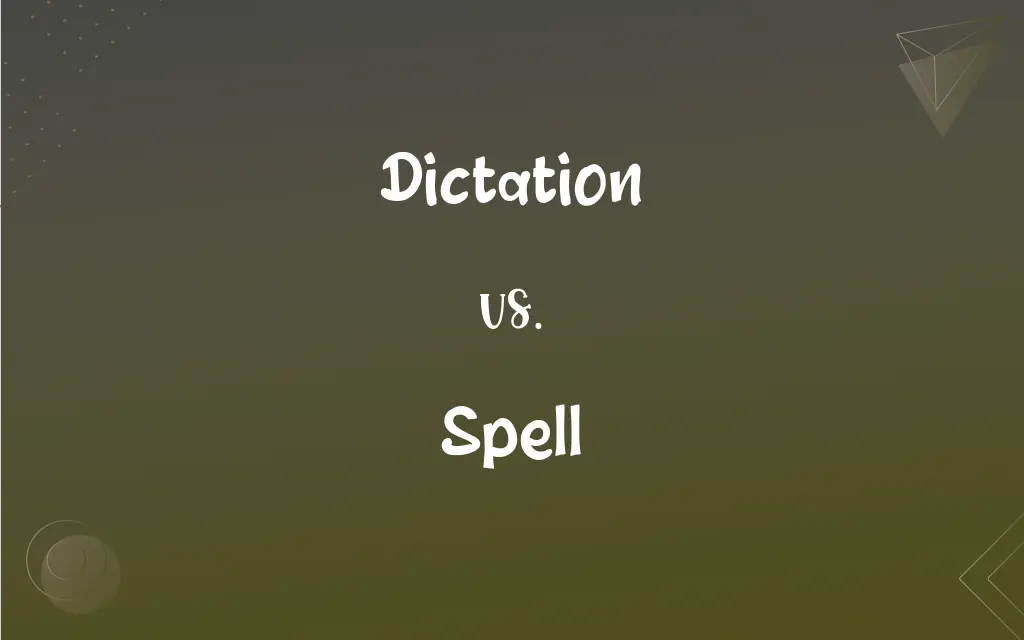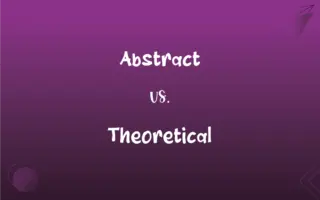Dictation vs. Spell: What's the Difference?
Edited by Aimie Carlson || By Janet White || Updated on October 2, 2023
"Dictation is the act of saying words aloud to be written down by another, while to spell is to name or write the letters of a word in order."

Key Differences
Dictation refers to the process where one person verbally articulates words or sentences, and another person writes them down or types them. It is a method often used to assess listening and writing skills in an educational setting or to create written documents in a professional setting. In contrast, the word spell, as a verb, means to name or write the letters of a word in the correct sequence. It's a fundamental skill taught from early education, critical for reading and writing proficiency.
In educational contexts, dictation is often employed as an exercise to evaluate and improve a variety of language skills, including grammar, vocabulary, and sentence structure. It serves as a multi-faceted tool, aiding the learning process of a language. The act of spelling, however, is primarily associated with learning and understanding the construction of words, contributing to literacy development and enabling effective communication, as it ensures words are written correctly and understood by readers.
When dictation is used, it inherently involves a speaker and a listener or a writer, emphasizing the dynamic interaction between speaking and writing. This interaction facilitates the exchange and recording of information, ideas, or language elements. Spelling, however, is more solitary, focusing on an individual’s ability to correctly sequence letters to form words, fostering understanding and enhancing readability, essential for both verbal and written communications.
In professional settings, dictation can be a productive way of creating documents, allowing speakers to articulate thoughts while listeners transcribe, making the process efficient and collaborative. Meanwhile, correct spelling is indispensable in professional communication, ensuring clarity, preventing misunderstandings, and maintaining professionalism, as misspelled words can lead to misinterpretation and can reflect poorly on professionalism.
Dictation and spelling, while different in their application and focus, are interconnected aspects of language and communication. Dictation necessitates clear articulation and accurate transcription, fostering active listening and precise writing. Spelling, being fundamental to literacy, serves as the backbone of both verbal and written communication, emphasizing the importance of letter arrangement in word construction and comprehension.
ADVERTISEMENT
Comparison Chart
Definition
Act of saying words aloud for another to write down.
Naming or writing the letters of a word in order.
Usage
In educational and professional settings for transcribing.
In education to develop literacy and communication.
Focus
Involves speaking, listening, and writing skills.
Primarily involves individual’s literacy skills.
Application
Involves interaction between a speaker and a transcriber.
Solitary, focuses on correct sequencing of letters.
Importance
Aids in learning language skills and creating documents.
Essential for clear, effective communication.
ADVERTISEMENT
Dictation and Spell Definitions
Dictation
The saying of words aloud to be written down by another.
The teacher gave a dictation to assess the students' listening and writing skills.
Spell
To constitute the letters of a word.
These letters spell a meaningful word.
Dictation
An exercise involving listening to words or sentences and writing them down.
Language learners often practice dictation to improve their vocabulary and grammar.
Spell
A correct arrangement of letters forming a word.
The word cat is an easy spell for young learners.
Dictation
The act or process of transcribing spoken words.
Dictation helps in creating documents efficiently in professional settings.
Spell
A period of time during which one is doing a particular activity.
After a long spell of work, she took a short break.
Dictation
Verbal instructions or information to be recorded in writing.
His secretary took dictation for the letter he wanted to send out.
Spell
To name or write in order the letters constituting (a word).
Dictation
A spoken passage, test, or exercise to test one's ability to comprehend and write.
The students took a dictation to evaluate their understanding of the new vocabulary.
Spell
To constitute the letters of (a word)
These letters spell animal.
Dictation
The act or process of dictating material to another for transcription.
Spell
To add up to; signify
Their unwise investment could spell financial ruin.
Dictation
The material so dictated.
Spell
To name or write in order the letters of a word or words
I've never been able to spell very well.
Dictation
An authoritative command or order.
Spell
To put (someone) under a spell; bewitch.
Dictation
(uncountable) Dictating, the process of speaking for someone else to write down the words.
Since I learned shorthand, I can take dictation at eighty words a minute.
Spell
To relieve (someone) from work temporarily by taking a turn.
Dictation
(countable) An activity in school where the teacher reads a passage aloud and the students write it down.
Spell
To allow (someone) to rest a while.
Dictation
(countable) The act of ordering or commanding.
Spell
To take turns working.
Dictation
(uncountable) Orders given in an overbearing manner.
His habit, even with friends, was that of dictation.
Spell
(Australian) To rest for a time from an activity.
Dictation
The act of dictating; the act or practice of prescribing; also that which is dictated.
It affords security against the dictation of laws.
Spell
A word or formula believed to have magic power.
Dictation
The speaking to, or the giving orders to, in an overbearing manner; authoritative utterance; as, his habit, even with friends, was that of dictation.
Spell
A bewitched state or trance
The sorcerer put the prince under a spell.
Dictation
An authoritative direction or instruction to do something
Spell
A compelling attraction; charm or fascination
The spell of the theater.
Dictation
Speech intended for reproduction in writing
Spell
A short, indefinite period of time.
Dictation
Matter that has been dictated and transcribed; a dictated passage;
He mailed the dictation without bothering to read it
Spell
(Informal) A period of weather of a particular kind
A dry spell.
Spell
One's turn at work.
Spell
A period of work; a shift.
Spell
(Australian) A period of rest.
Spell
(Informal) A period of physical or mental disorder or distress
A dizzy spell.
Spell
(Informal) A short distance.
Spell
Words or a formula supposed to have magical powers.
He cast a spell to cure warts.
Spell
A magical effect or influence induced by an incantation or formula.
Under a spell
Spell
(obsolete) Speech, discourse.
Spell
A shift (of work); (rare) a set of workers responsible for a specific turn of labour.
Spell
(informal) A definite period (of work or other activity).
Spell
(colloquial) An indefinite period of time (usually with a qualifier); by extension, a relatively short distance.
Spell
A period of rest; time off.
Spell
A period of illness, or sudden interval of bad spirits, disease etc.
Spell
(cricket) An uninterrupted series of alternate overs bowled by a single bowler.
Spell
(dialectal) A splinter, usually of wood; a spelk.
Spell
The wooden bat in the game of trap ball, or knurr and spell.
Spell
To put under the influence of a spell; to affect by a spell; to bewitch; to fascinate; to charm.
Spell
To read (something) as though letter by letter; to peruse slowly or with effort.
Spell
To write or say the letters that form a word or part of a word.
Spell
(intransitive) To be able to write or say the letters that form words.
I find it difficult to spell because I'm dyslexic.
Spell
(transitive) Of letters: to compose (a word).
The letters “a”, “n” and “d” spell “and”.
Spell
To clarify; to explain in detail.
Please spell it out for me.
Spell
(transitive) To indicate that (some event) will occur.
This spells trouble.
Spell
To constitute; to measure.
Spell
(obsolete) To speak, to declaim.
Spell
(obsolete) To tell; to relate; to teach.
Spell
(transitive) To work in place of (someone).
To spell the helmsman
Spell
(transitive) To rest (someone or something), to give someone or something a rest or break.
They spelled the horses and rested in the shade of some trees near a brook.
Spell
To rest from work for a time.
Spell
A spelk, or splinter.
Spell
The relief of one person by another in any piece of work or watching; also, a turn at work which is carried on by one person or gang relieving another; as, a spell at the pumps; a spell at the masthead.
A spell at the wheel is called a trick.
Spell
The time during which one person or gang works until relieved; hence, any relatively short period of time, whether a few hours, days, or weeks.
Nothing new has happened in this quarter, except the setting in of a severe spell of cold weather.
Spell
One of two or more persons or gangs who work by spells.
Their toil is so extreme that they can not endure it above four hours in a day, but are succeeded by spells.
Spell
A gratuitous helping forward of another's work; as, a logging spell.
Spell
A story; a tale.
Spell
A stanza, verse, or phrase supposed to be endowed with magical power; an incantation; hence, any charm.
Start not; her actions shall be holy asYou hear my spell is lawful.
Spell
To supply the place of for a time; to take the turn of, at work; to relieve; as, to spell the helmsman.
Spell
To tell; to relate; to teach.
Might I that legend find,By fairies spelt in mystic rhymes.
Spell
To put under the influence of a spell; to affect by a spell; to bewitch; to fascinate; to charm.
He was much spelled with Eleanor Talbot.
Spell
To constitute; to measure.
The Saxon heptarchy, when seven kings put together did spell but one in effect.
Spell
To tell or name in their proper order letters of, as a word; to write or print in order the letters of, esp. the proper letters; to form, as words, by correct orthography.
The word "satire" ought to be spelled with i, and not with y.
Spell
To discover by characters or marks; to read with difficulty; - usually with out; as, to spell out the sense of an author; to spell out a verse in the Bible.
To spell out a God in the works of creation.
To sit spelling and observing divine justice upon every accident.
Spell
To form words with letters, esp. with the proper letters, either orally or in writing.
When what small knowledge was, in them did dwell,And he a god, who could but read or spell.
Spell
To study by noting characters; to gain knowledge or learn the meaning of anything, by study.
Where I may sit and rightly spellOf every star that heaven doth shew,And every herb that sips the dew.
Spell
A psychological state induced by (or as if induced by) a magical incantation
Spell
A time for working (after which you will be relieved by someone else);
It's my go
A spell of work
Spell
A period of indeterminate length (usually short) marked by some action or condition;
He was here for a little while
I need to rest for a piece
A spell of good weather
A patch of bad weather
Spell
A verbal formula believed to have magical force;
He whispered a spell as he moved his hands
Inscribed around its base is a charm in Balinese
Spell
Recite the letters of or give the spelling of;
How do you spell this word?
Spell
Indicate or signify;
I'm afraid this spells trouble!
Spell
Write or name the letters that comprise the conventionally accepted form of (a word or part of a word);
He spelled the word wrong in this letter
Spell
Place under a spell
Spell
To name or write the letters of a word in the correct sequence.
Can you spell your last name for me?
Spell
To signify or mean something.
Dark clouds usually spell impending rain.
FAQs
Does dictation involve interaction between a speaker and a transcriber?
Yes, dictation involves interaction between a speaker and a transcriber or writer.
Why is spelling important?
Spelling is important for clear and effective communication and is fundamental to literacy.
What does dictation involve?
Dictation involves one person speaking words aloud for another person to write down.
Is dictation used in educational settings?
Yes, dictation is often used in educational settings to assess and improve listening and writing skills.
Can dictation aid in learning language skills?
Yes, dictation can significantly aid in learning and reinforcing various language skills.
What does it mean to spell a word?
To spell a word means to name or write the letters of that word in the correct order.
Is spelling a solitary skill?
Yes, spelling is primarily a solitary skill focusing on an individual’s ability to sequence letters correctly.
Can dictation facilitate exchange and recording of information?
Yes, dictation facilitates the accurate exchange and recording of information or ideas.
Is spelling essential for reading and writing proficiency?
Absolutely, correct spelling is indispensable for reading comprehension and writing proficiency.
Can spelling errors reflect poorly in professional settings?
Yes, spelling errors can be perceived as unprofessional and can adversely impact the communicator’s credibility.
Is dictation a collaborative process?
Yes, dictation is essentially a collaborative process involving a speaker and a writer or transcriber.
Does dictation require clear articulation from the speaker?
Yes, dictation requires clear and precise articulation from the speaker for accurate transcription.
Can poor spelling lead to misinterpretation of written text?
Yes, poor spelling can lead to ambiguity and misinterpretation of the intended message in written text.
Can dictation be used for creating documents?
Yes, dictation is frequently used for creating documents, especially in professional settings.
Can incorrect spelling lead to communication issues?
Yes, incorrect spelling can cause misunderstandings and misinterpretations in communication.
Is spelling related to literacy development?
Yes, learning to spell correctly is a crucial component of literacy development.
Is spelling a fundamental skill taught from early education?
Absolutely, spelling is a fundamental skill taught from early education to enable effective communication.
Does spelling contribute to the readability of written text?
Undoubtedly, correct spelling significantly contributes to the readability and comprehension of written text.
Does dictation assess listening and writing skills?
Yes, dictation serves as an effective tool to assess both listening and writing skills.
Is dictation helpful in language learning?
Indeed, dictation is helpful in learning vocabulary, grammar, and sentence structure in a new language.
About Author
Written by
Janet WhiteJanet White has been an esteemed writer and blogger for Difference Wiki. Holding a Master's degree in Science and Medical Journalism from the prestigious Boston University, she has consistently demonstrated her expertise and passion for her field. When she's not immersed in her work, Janet relishes her time exercising, delving into a good book, and cherishing moments with friends and family.
Edited by
Aimie CarlsonAimie Carlson, holding a master's degree in English literature, is a fervent English language enthusiast. She lends her writing talents to Difference Wiki, a prominent website that specializes in comparisons, offering readers insightful analyses that both captivate and inform.































































